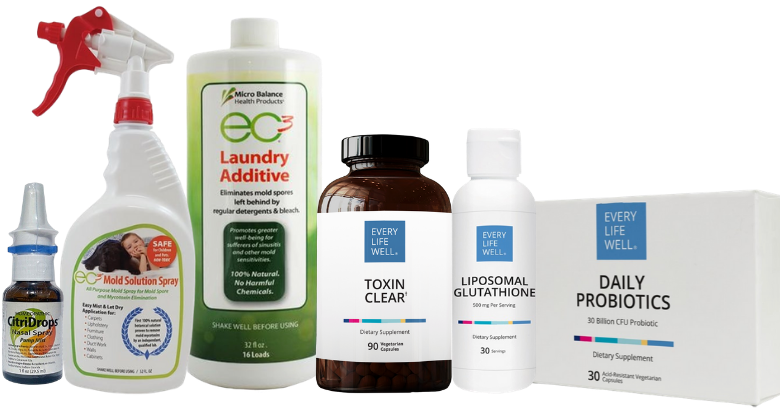Natural Migraine Solutions
If you suffer from migraines you know all too well the challenge of preventing a migraine or stopping the pain in its tracks. With so many patients feeling the limitations of conventional migraine medications, either because of their ineffectiveness or side effects, I’m often asked if there is another way. Are there more natural approaches to migraine management?
From my Functional Medicine perspective, no two migraine sufferers are the same. Each person will have different genetic factors, nutrient deficiencies, and needs for detoxification as well as triggers for migraines. When we take this comprehensive view, it’s easy to see that different prevention and treatment strategies will work for different people. Luckily, I have a lot of tools in my medical toolkit to help.
The goal is to help you identify your personal root causes and triggers in order to reduce the frequency and severity of your migraines and even to live migraine-free. If you didn’t think living migraine-free was possible, here’s your chance to explore some influences, triggers and ideas that perhaps you haven’t considered before.
Migraines don’t happen only in the head, the root causes stem from a variety of imbalances in the body, as well as from our interactions with the environment. That’s exactly what I’m going to talk about today. Keep reading to learn more about:
- Migraine basics
- Common migraine triggers
- My top migraine prevention strategies and supplements
What Is A Migraine?
Migraines are severe headaches that are typically one sided and commonly accompanied by other symptoms including nausea, vomiting, and sensitivity to light as well as to sound. They last anywhere from a few hours to a few days and are sometimes preceded by a warning of visual change called an aura.
Migraines affect 39 million Americans, mostly women, and are a major cause of disability in people under 50 years old.
Migraines cost the healthcare system 78 billion dollars per year in addition to the personal costs of missing work and other aspects of life.
Migraines have both genetic and environmental factors that contribute to an imbalance in brain chemistry that causes the pain. Several mechanism have been identified as contributors including:
- Vascular dysfunction
- Inflammation
- Oxidative stress
- Imbalances in neurotransmitters including serotonin and calcitonin gene-related peptide (CGRP)
- Triggering of the trigeminal nerve
- Poor methylation
Migraine pain is often debilitating, forcing sufferers to put their life on hold and retreat to a dark and quiet room. Migraines are episodic, happening on occasion, or chronic when someone has more than 15 migraine days per month. Many people suffer in silence as they don’t want their pain to be a burden on those around them.
Since prevention is the best medicine, let’s talk about identifying migraine triggers so migraine pain can be avoided all together.
Migraine Triggers And Root Causes
The list of migraine triggers is long and not every trigger will apply to everyone, but these are the main areas to explore if you haven’t yet.
- Food sensitivities – sensitivities to gluten, dairy and other foods contribute to inflammation
- Other food triggers: caffeine, chocolate, alcohol, artificial sweeteners
- Food additives: food dyes, MSG, sulfites, nitrates
- Fermented and aged foods (high in tyramine): cheese, aged/cured meats, pickles, sauerkraut, soy sauce
- Hypoglycemia – drops in blood sugar (more on this below)
- Nutrient deficiencies such as magnesium, riboflavin (vitamin B2), vitamin B12 and others
- Stress
- Trauma
- Sensory overload (such as fluorescent or flickering lights or crowded environments)
- Exposure to toxins or poor detoxification systems
- Strong odors including perfumes, cleaning chemicals and others
- Digestion issues, including constipation, IBS and others
- Hormonal imbalances or fluctuations, especially with estrogen
- Overuse of pain medications, including migraine medications and NSAIDS
- Changes in sleep patterns
- Low melatonin, the sleep hormone
- Dehydration
- Inconsistent exercise
- Weather and barometric pressure changes
Alternative Migraine Treatments And Prevention Strategies
Whereas medications may have a place in migraine therapy for certain people, let’s not underestimate the power of simple diet and lifestyle strategies for migraine prevention. Migraine prevention is truly the best treatment strategy!
Here are some suggestions for uncovering and addressing the root causes of your migraines and headaches.
- Keep a migraine log. By logging your migraines, along with your diet, lifestyle habits and the specific triggers that you think might be contributing to your headaches, you begin to see the patterns. As you identify your triggers, work on reducing, replacing and removing them from your life. Since you won’t be able to control all of the triggers all of the time, focus on what you have in your control in order to eliminate exposure to as many triggers as often as possible.
- Do an elimination diet. An elimination diet is a great way to uncover your personal food sensitivities and the foods that cause inflammation contributing to migraines. I often start with a Paleo diet, since gluten, grains and dairy are common foods associated with migraines. Some people may need to experiment with removing eggs, nightshade vegetables (potatoes, tomatoes, eggplant and pepper) and even nuts, along with many of the additives and specific foods listed above. After a period of time following the elimination diet, such as 3-6 weeks, foods are reintroduced one at a time to see if symptoms or migraines return.
- Consider a therapeutic diet. Beyond identifying food triggers, a variety of diets may be helpful in migraine control and prevention. A ketogenic, or keto, diet is a high fat, low carbohydrate diet that is used as a therapy for many neurological conditions because it improves mitochondrial function, decreases CGRP and reduces neuro-inflammation. A keto diet, Paleo diet and other forms of low-glycemic diets may support and prevent migraines by helping to balance blood sugar. In addition, diets that balance omega-3 and omega-6 fats may also reduce inflammation. Also, termed the “epigenetic diet,” a folate-rich diet that supports methylation is beginning to be explored in terms of migraine prevention and therapy. Collaborating with a Functional Medicine provider, such as myself, helps to determine which dietary strategies might be a good fit for you.
- Balance blood sugar. Hypoglycemia, or a drop in blood sugar, is a common migraine trigger. By using easy diet strategies to keep blood sugar more stable, you may help prevent migraines. Here are some ways to do that – no matter what type of diet you are following:
- Eat balanced meals that include protein, fat and fiber.
- Start the day with a nourishing breakfast.
- Reduce or eliminate refined carbohydrates – sugar and flours – that spike blood sugar. This means ditch the processed foods and sugary beverages.
- Don’t skip meals.
- Don’t eat “naked carbs,” meaning pair your carbs with fat or protein. For example, have your apple with almond butter.
- Heal your gut. The gut-brain connection is well established and what goes on in the digestive system certainly impacts what goes on in the brain. Several digestive disorders are associated with migraines and we are still learning more about the mechanisms behind this. It’s safe to say that the microbiome plays a role. I recommend comprehensive stool testing and a personalized 5R Protocol in order to optimize digestive health and support the gut-brain axis.
- Use targeted supplements. Supplements are incredibly beneficial for preventing migraines and restoring balanced nutrition. I’ve found that even when patients with migraines test with optimal nutrient levels, they still may benefit from some of these ideas.
- B vitamins – I often recommend a B Complex with the active forms of the nutrients to support methylation, detoxification and mitochondrial health. Riboflavin, vitamin B2 at a dose of 400 mg per day is well tolerated, inexpensive and may reduce headache frequency when taken regularly. Vitamin B2 deficiency is associated with migraine and helps to support methylation.
- Magnesium – Oral magnesium has been shown to reduce both the frequency and intensity of migraines. Consider taking magnesium glycinate at a dose of 600-1200mg per day.
- Curcumin – Curcumin, the active component in turmeric, has been well studied for pain relieving effects and now there is some research adding it to the list of possible migraine prevention strategies. One study combined curcumin with omega-3 fats, another anti-inflammatory nutrient, and found a synergistic relationship.
- Melatonin – Since melatonin deficiency has been associated with migraine. Melatonin supplementation is effective for some individuals where this connection holds true.
- Coenzyme Q10 – CoQ10 is a mitochondrial support nutrient that has been shown to be effective for migraine sufferers, especially in combination with magnesium and some of the other prevention strategies discussed here.
- Liver support – Supporting liver detoxification may be helpful in treating the root cause for some migraine sufferers, including those whose migraines are triggered by excess estrogen or fluctuations in estrogen. Every Life Well Detox Support can be helpful.
- Probiotics – Of course, we can’t forget the importance of the gut microbiome in overall health and specifically for brain health. Since migraines are often associated with GI imbalances, supporting a healthy microbiome may be an important root cause strategy. Use probiotics therapeutically or for daily support.
Often migraine sufferers don’t look at diet and lifestyle changes until they’ve exhausted their medication options, but these suggestions are really at the top of my list when it comes to migraines, instead of a last resort. By uncovering your personal root cause, you can prevent migraines by removing the triggers of inflammation and pain in your head.
References
- Razeghi Jahromi, S., Ghorbani, Z., Martelletti, P., Lampl, C., Togha, M., & School of Advanced Studies of the European Headache Federation (EHF-SAS) (2019). Association of diet and headache. The journal of headache and pain, 20(1), 106.
- Fila, M., Chojnacki, C., Chojnacki, J., & Blasiak, J. (2019). Is an “Epigenetic Diet” for Migraines Justified? The Case of Folate and DNA Methylation. Nutrients, 11(11), 2763.
- Deneris, A., Rosati Allen, P., Hart Hayes, E., & Latendresse, G. (2017). Migraines in Women: Current Evidence for Management of Episodic and Chronic Migraines. Journal of midwifery & women’s health, 62(3), 270–285.
- Barbanti, P., Fofi, L., Aurilia, C., Egeo, G., & Caprio, M. (2017). Ketogenic diet in migraine: rationale, findings and perspectives. Neurological sciences : official journal of the Italian Neurological Society and of the Italian Society of Clinical Neurophysiology, 38(Suppl 1), 111-115.
- Gross, E. C., Klement, R. J., Schoenen, J., D’Agostino, D. P., & Fischer, D. (2019). Potential Protective Mechanisms of Ketone Bodies in Migraine Prevention. Nutrients, 11(4), 811.
- Cámara-Lemarroy, C. R., Rodriguez-Gutierrez, R., Monreal-Robles, R., & Marfil-Rivera, A. (2016). Gastrointestinal disorders associated with migraine: A comprehensive review. World journal of gastroenterology, 22(36), 8149–8160.
- Thompson, D. F., & Saluja, H. S. (2017). Prophylaxis of migraine headaches with riboflavin: A systematic review. Journal of clinical pharmacy and therapeutics, 42(4), 394–403.
- Chiu, H. Y., Yeh, T. H., Huang, Y. C., & Chen, P. Y. (2016). Effects of Intravenous and Oral Magnesium on Reducing Migraine: A Meta-analysis of Randomized Controlled Trials. Pain physician, 19(1), E97–E112.
- Abdolahi, M., Sarraf, P., Javanbakht, M. H., Honarvar, N. M., Hatami, M., Soveyd, N., Tafakhori, A., Sedighiyan, M., Djalali, M., Jafarieh, A., Masoudian, Y., & Djalali, M. (2018). A Novel Combination of ω-3 Fatty Acids and Nano-Curcumin Modulates Interleukin-6 Gene Expression and High Sensitivity C-reactive Protein Serum Levels in Patients with Migraine: A Randomized Clinical Trial Study. CNS & neurological disorders drug targets, 17(6), 430–438.
- Wells, R. E., Beuthin, J., & Granetzke, L. (2019). Complementary and Integrative Medicine for Episodic Migraine: an Update of Evidence from the Last 3 Years. Current pain and headache reports, 23(2), 10.
- Dai, Y. J., Wang, H. Y., Wang, X. J., Kaye, A. D., & Sun, Y. H. (2017). Potential Beneficial Effects of Probiotics on Human Migraine Headache: A Literature Review. Pain physician, 20(2), E251–E255.













